Key takeaways:
- Budgeting provides clarity on financial health, helping prioritize expenses and achieve both short-term and long-term goals.
- Regularly evaluating income sources and expenses allows for informed fund allocation and proactive adjustments to spending plans.
- Ongoing monitoring of financial progress and readiness to adjust budgeting strategies ensures alignment with changing life circumstances and personal values.
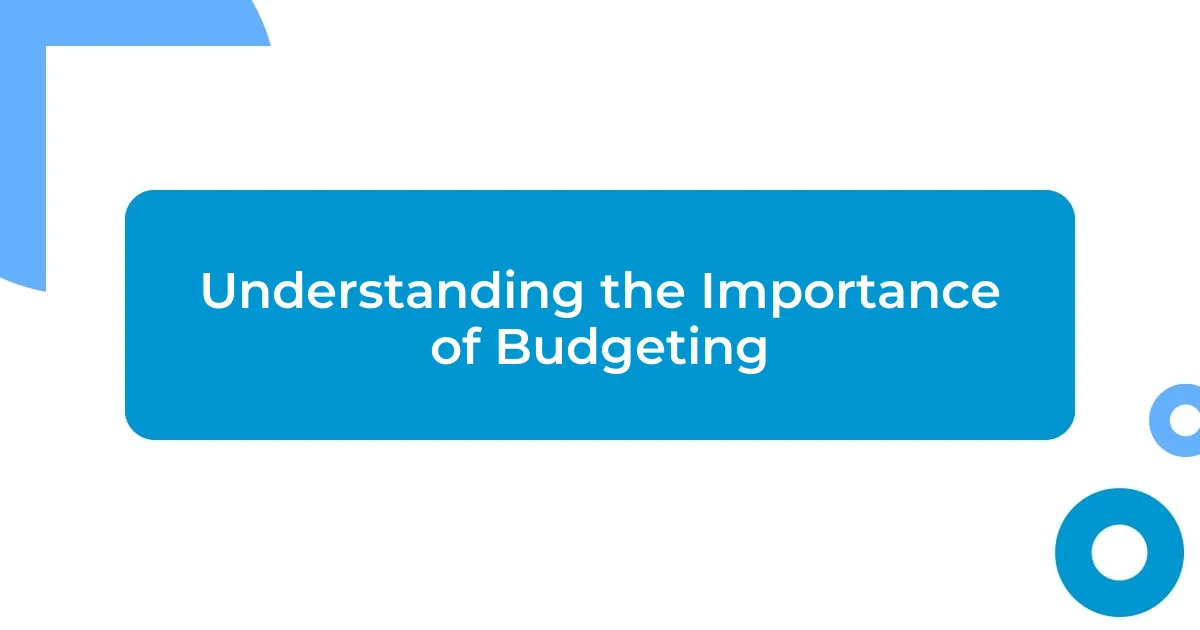
Understanding the Importance of Budgeting
Budgeting is essential for anyone seeking financial stability. I remember when I first got my paycheck; it felt like a goldmine. But without a solid budget, that money vanished faster than I could comprehend. Have you ever had that sinking feeling when you realize your bank balance is lower than expected? I certainly did, and it sparked a realization about the power of planning.
Creating a budget isn’t just about tracking expenses; it provides a clear picture of your financial health. Think of it as a roadmap for your journey—without it, you might find yourself lost in a maze of bills and impulse purchases. I vividly recall the relief I felt when I began allocating specific amounts for essentials, savings, and little treats. That simple practice transformed my financial anxiety into confidence.
Understanding budgeting also helps you set priorities, enabling you to decide what truly matters to you. Back in college, I faced the choice between going out with friends or saving for a weekend trip. By clearly seeing my funds allocated, I could enjoy both without guilt. Isn’t it amazing how budgeting empowers you to make mindful decisions rather than react to situations haphazardly?
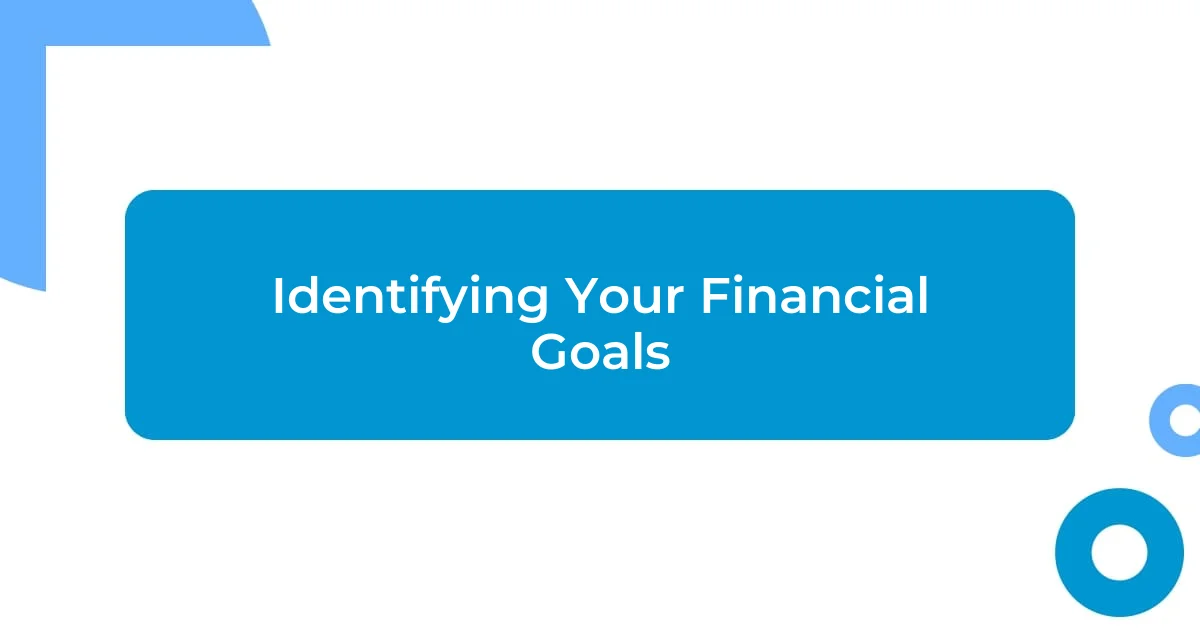
Identifying Your Financial Goals
Identifying your financial goals is all about self-reflection and pinpointing what truly matters to you. I remember sitting down one evening with a cup of tea, contemplating my future. It was a turning point when I realized I had to categorize my goals—short-term desires like travel and long-term aspirations like homeownership. This exercise clarified my priorities and gave my budget direction.
To effectively identify your financial goals, consider the following:
- Short-Term Goals (e.g., saving for a vacation, paying off credit card debt)
- Medium-Term Goals (e.g., buying a car, saving for a wedding)
- Long-Term Goals (e.g., purchasing a home, retirement savings)
- Emotional Drivers (e.g., experiences that bring joy or stability)
The process of identifying these goals might evoke some strong emotions. Reflecting on what you want can be empowering—and sometimes daunting. I’ve felt that sweet rush of motivation when I outlined concrete steps toward my dreams, and it’s that feeling I strive for whenever I reassess my goals.
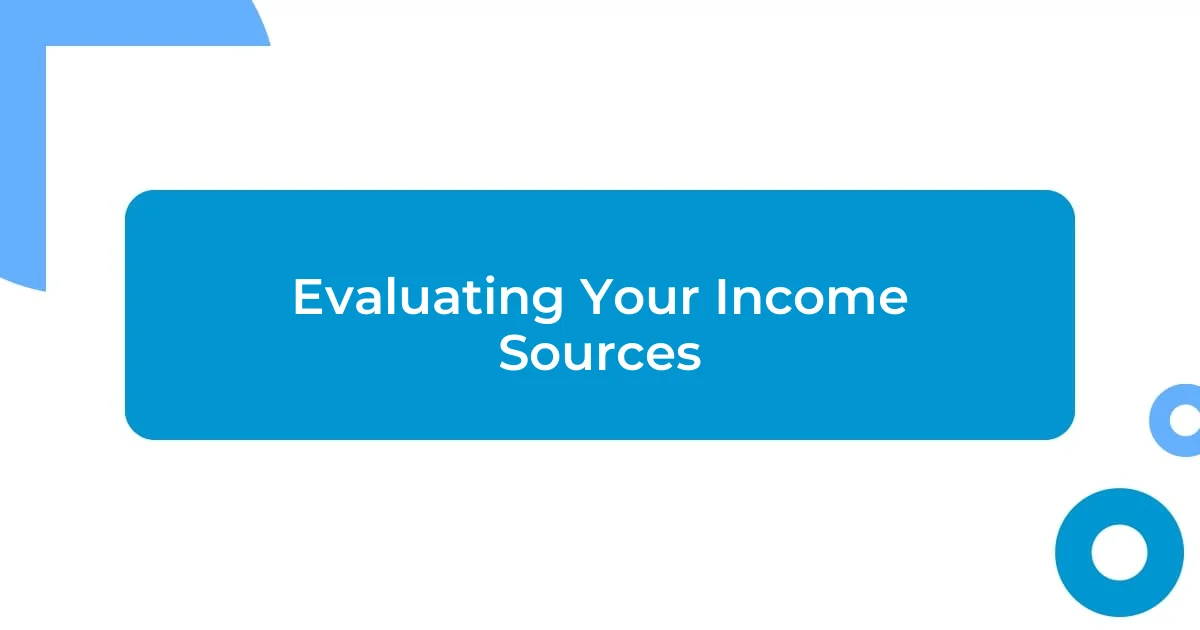
Evaluating Your Income Sources
Evaluating your income sources is a crucial step in understanding where your money comes from and how to allocate it wisely. Early in my financial journey, I noticed how my income streams varied, which impacted my budgeting decisions. For instance, I had a steady job but also did freelance work on the side. This dual income taught me to assess the reliability of each source, shaping my overall financial strategy.
I found it essential to distinguish between stable, recurring income and sporadic earnings. For example, my salary provided a firm base, but the freelance gigs often felt like a bonus, adding excitement—and sometimes anxiety—about planning my finances. By evaluating the consistency of these income sources, I realized that relying too heavily on an unpredictable stream could lead to budgeting challenges. Have you ever had a time where a single paycheck couldn’t cover unexpected expenses? This clarity helped me identify how much I could confidently allocate toward savings versus day-to-day spending.
Regularly revisiting my income sources has become part of my financial routine. It’s an enlightening process that reveals shifts in my earning patterns, allowing me to adjust my budget accordingly. Just last month, I noticed a drop in my freelance work due to seasonal demand and immediately tweaked my spending plan. That proactive approach not only eased my anxiety but also reinforced the importance of having a clear view of where the money comes from before tackling expenditures.
| Income Source | Stability Rating |
|---|---|
| Salary | High |
| Freelance Work | Variable |
| Investment Income | Moderate |
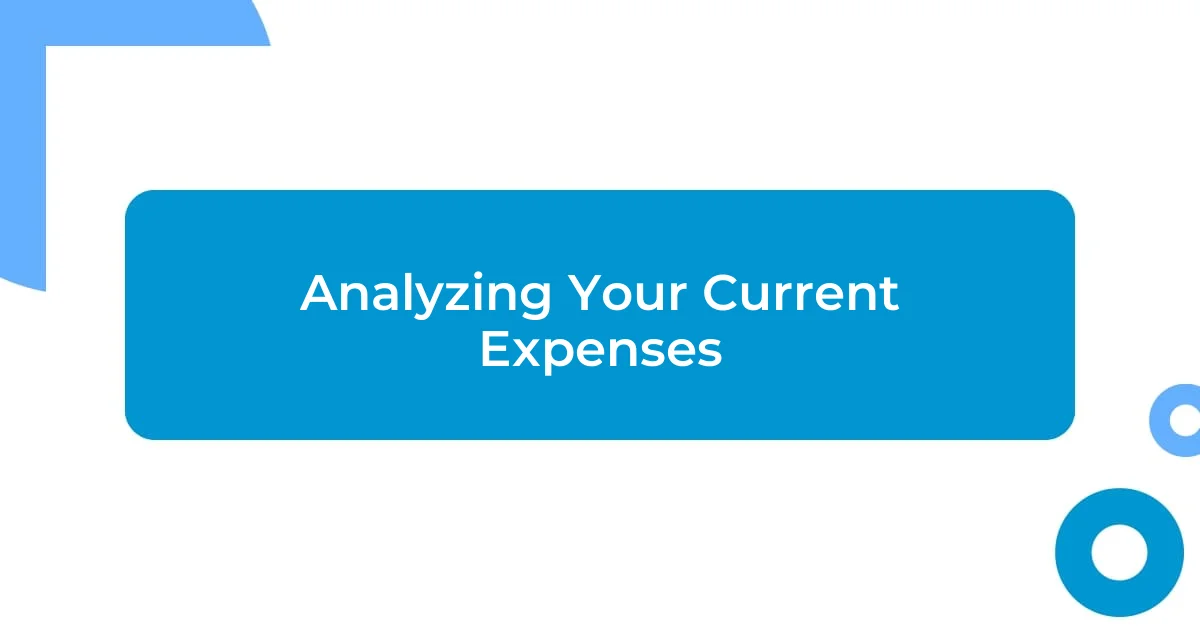
Analyzing Your Current Expenses
Analyzing your current expenses is like taking a close-up photo of your financial landscape. I vividly remember the moment I laid out all my monthly bills on a spreadsheet. I was surprised to see just how much I was spending on dining out and subscriptions I barely used. This kind of clarity can be jarring but ultimately liberating—how often do you stop to really look at where your money is going?
I began categorizing my expenses into fixed and variable costs. I found that while my rent was non-negotiable, I could easily cut back on entertainment and impulse purchases. It shocked me to discover that just cutting back on a few coffee runs could save me almost $100 a month. Have you ever kept track of those small expenses that add up over time? Once I gathered all this information, the effect on my budget was profound and transformative.
This ongoing analysis isn’t just about numbers; it’s about understanding your lifestyle choices. After reevaluating my spending, I felt a mix of relief and empowerment. It was uplifting to see where I could adjust without sacrificing what I truly enjoy. It made me ask myself, “What are my priorities?” That question pushed me to make more informed decisions about my money, aligning my expenditures with my personal values. I learned that being conscious about my spending habits wasn’t constrictive—it was liberating.
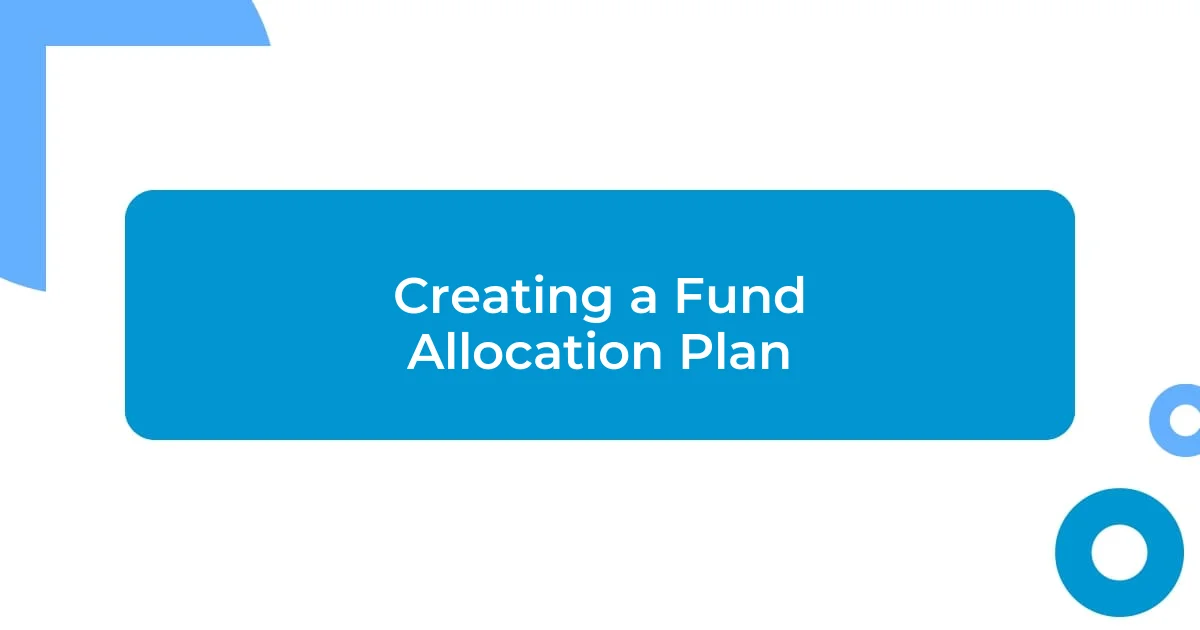
Creating a Fund Allocation Plan
Creating a fund allocation plan starts with understanding your overall financial goals. I remember when I first attempted this; it felt overwhelming. However, breaking down my goals into short-term, medium-term, and long-term categories made everything more manageable. Have you ever faced the pressure of juggling multiple financial objectives? By defining what I wanted to achieve—like saving for a vacation, a new car, or retirement—I could clearly see how to allocate my funds meaningfully.
One practical step I took was to create a visual representation of my fund allocation. Using a simple pie chart, I could easily see how much I should dedicate to each goal. It was enlightening to realize that while saving for retirement is crucial, I didn’t have to sacrifice my present enjoyment completely. I was able to prioritize save-and-splurge approaches, allowing me both security and a little fun. Have you thought about how visual aids could clarify your financial picture? That small adjustment transformed my approach and reduced my anxiety surrounding budgeting.
Lastly, I found it essential to revisit and adjust my fund allocation periodically. Life changes, and so should your financial plan. For instance, after a promotion at work, I was able to increase my savings rate, but I also felt compelled to allocate a bit more toward experiences that brought me joy, like travel. It’s important to reflect: when was the last time you evaluated your fund allocation? Establishing a routine check—even if it’s just once a quarter—can illuminate new opportunities and prevent old habits from creeping back in. This proactive attitude truly changed my financial landscape.
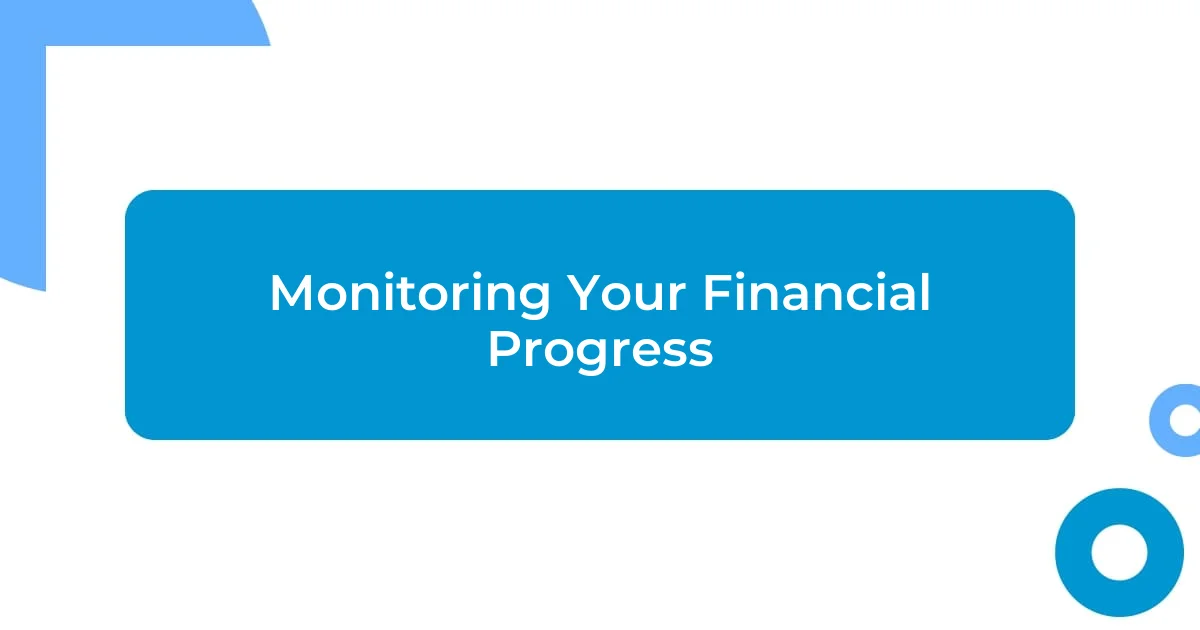
Monitoring Your Financial Progress
Monitoring your financial progress is a crucial step that can transform how you handle your money. I’ll never forget the first time I sat down with my budgeting app and looked at my tracked income and expenses over a month. Watching those patterns unfold in real-time felt akin to watching a movie where I was the star, but the plot was about my financial health. Have you ever been surprised by your own financial tendencies? I certainly was when the data revealed my spending triggers, like late-night online shopping after a tough week.
As I monitored these trends, I started setting monthly benchmarks for myself. At one point, I committed to reducing my overall spending by 10% to save for a new laptop. Seeing my progress week by week not only kept me accountable but also lit a fire in me to do better. It was like running a marathon; tracking my pace fueled my desire to finish strong. I encouraged myself by celebrating little wins, such as a week where I didn’t buy my usual takeout. Isn’t it rewarding to realize you can succeed in small ways?
Regularly checking in on my financial standings has become a habit that I cherish. I established a dedicated time each month to review my numbers and goals. This little ritual allowed me to reflect on how far I had come and make necessary adjustments. One month, I discovered that unexpected medical expenses tightened my budget, prompting me to switch up my spending strategies. It’s like fine-tuning an instrument; without regular checks, things can go slightly out of tune. What have you done to keep your financial journey melodious? Through this ongoing monitoring, I found a sense of security and clarity about my financial future.
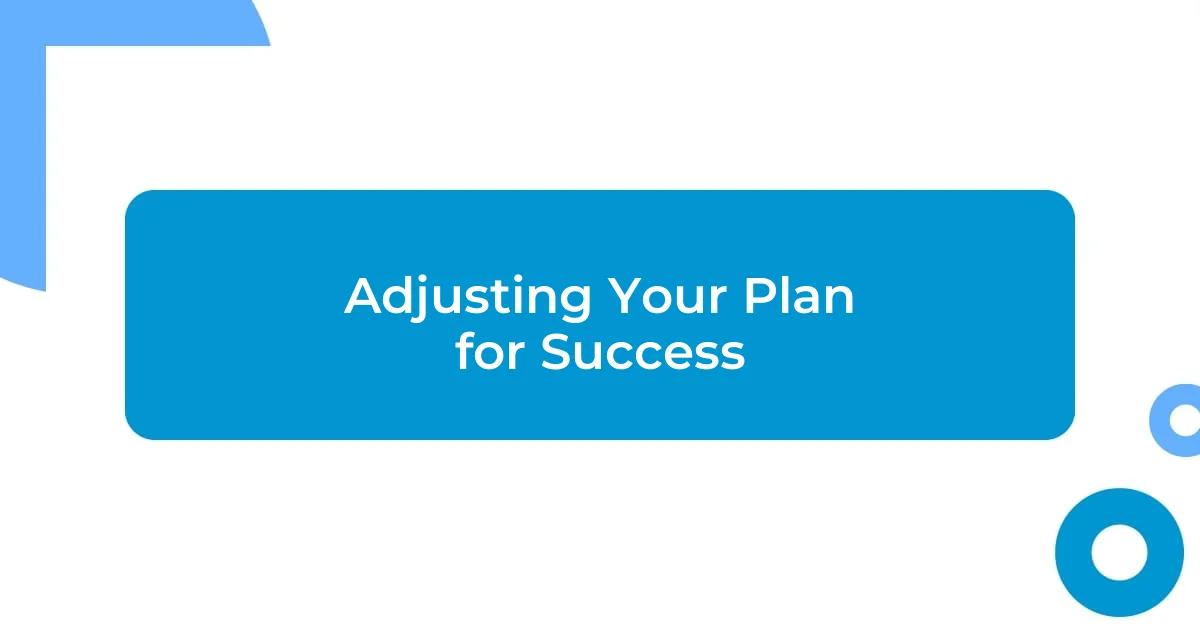
Adjusting Your Plan for Success
Adjusting your financial plan isn’t just a one-time task; it’s an ongoing journey that requires flexibility and awareness. I learned this lesson the hard way when I stubbornly adhered to my initial budget after a significant life change. After moving to a more expensive city, I found myself struggling to keep my finances in check. It was a wake-up call that made me realize prioritizing my expenses according to my new reality was essential. How often do we ignore the signs of change, thinking we can stick to our previous plans?
Embracing adjustments allowed me to prioritize important aspects of my life that had suddenly shifted. For instance, I had to allocate more funds toward my daily commute, but I also found creative ways to reduce other expenses, like cooking meals at home instead of dining out. It was a balancing act that taught me the importance of reallocating resources to fit new circumstances. Have you ever felt the discomfort of having to adjust your financial expectations? I certainly have, but discovering the fluid nature of my budget alleviated some stress and provided new opportunities for growth.
I started employing a monthly review system, where I would assess not only my income and expenditures but also my emotional responses to money. This practice shed light on the areas where I was overly restricted or unnecessarily indulgent. For example, realizing that I was depriving myself of small joys—like a weekend coffee shop visit—led me to adjust my budget creatively. It’s fascinating how our emotional well-being can influence financial decisions. What adjustments have you made to nurture both your financial health and your overall happiness? Reflecting on this ongoing dialogue with myself has dramatically enhanced my money management skills.














